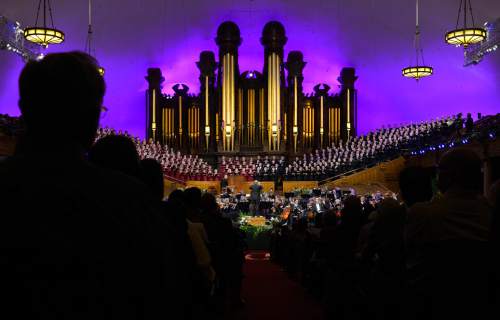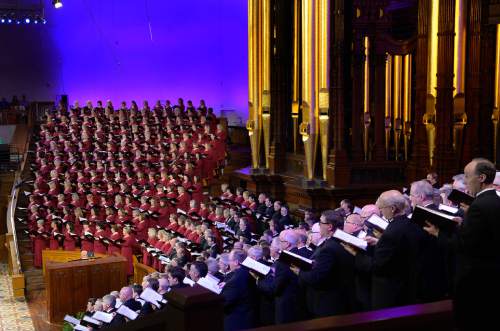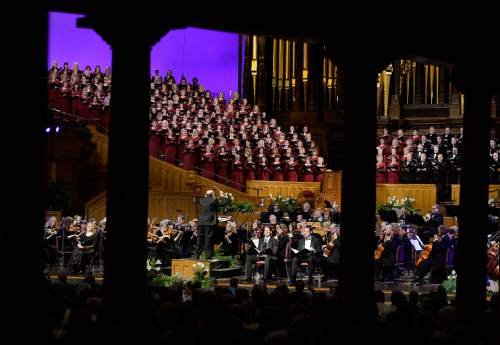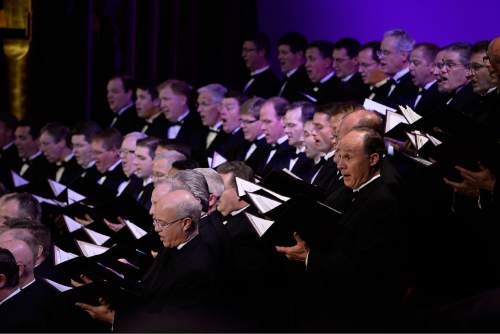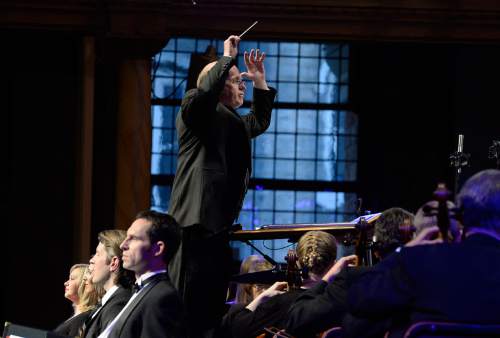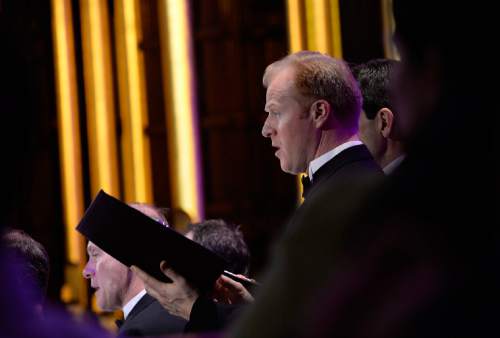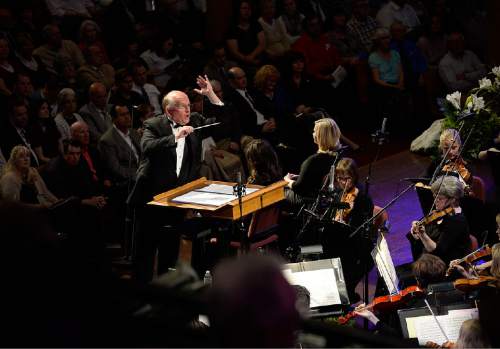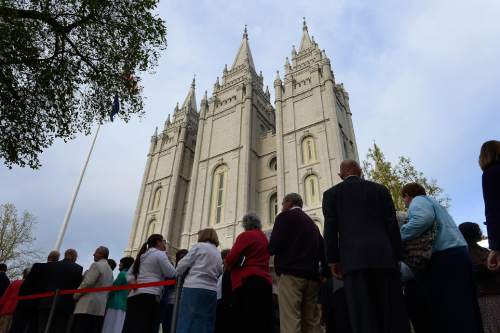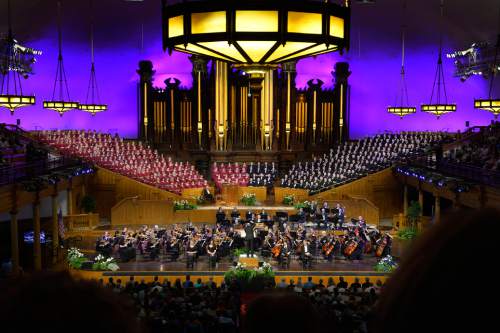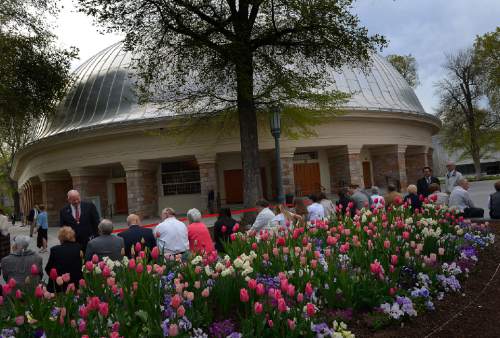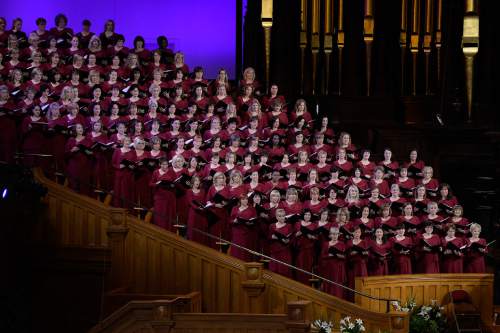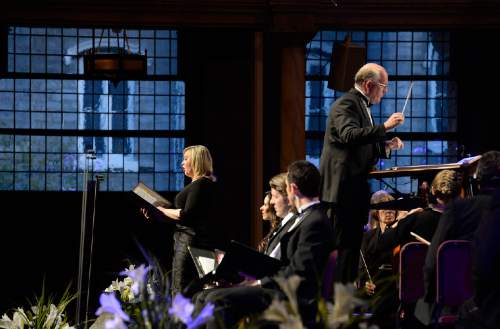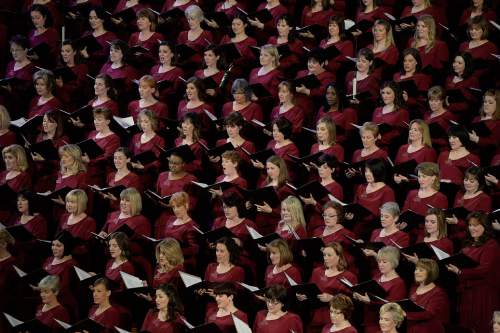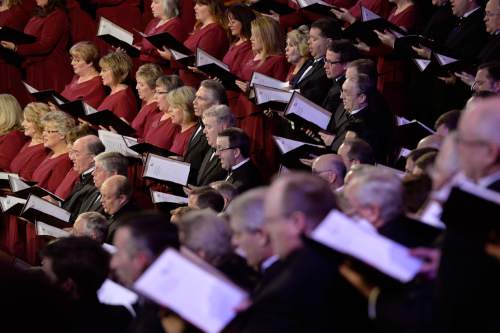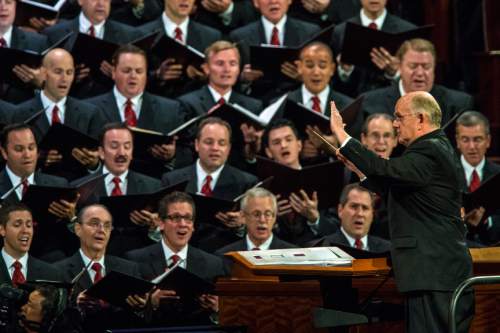This is an archived article that was published on sltrib.com in 2016, and information in the article may be outdated. It is provided only for personal research purposes and may not be reprinted.
Two of Utah's leading choral organizations will mark Easter weekend with performances of major works.
The Mormon Tabernacle Choir will perform Handel's "Messiah" in the Salt Lake Tabernacle on Thursday and Friday; Craig Jessop's American Festival Chorus will perform Bach's St. Matthew Passion in Logan on Friday and at Salt Lake City's Cathedral of the Madeleine on Saturday.
The Tabernacle Choir's performances of the Handel oratorio follow the release of a major recording and a "virtual chorus" video. The recording of music director Mack Wilberg's new edition of "Messiah" was two years in the making; the choir kicked off the project in April 2014 with its first-ever live performance of the complete oratorio. Wilberg noted at the time that he hadn't changed any of Handel's notes (nor the text, compiled by librettist Charles Jennens from Bible verses), but preparing the oratorio for performance required some adjustments to orchestration, note values and breath markings so as to allow his 360-voice choir and 100-piece Orchestra at Temple Square to sound more light and nimble, in keeping with current performance practice.
"I've tried to infuse as much modern musical scholarship as I can," the conductor said before the 2014 performances. "I had to study every note, vocal and instrumental, and make decisions about probably everything."
Two years later, he reported, "I am very proud of what the choir and orchestra were able to do. They did, in my estimation, a wonderful job bringing stylistic integrity and authenticity to the whole project." The recording is available in two versions: the full 2 ½-hour oratorio (on two discs, with a bonus DVD including several background features on the music, performance history and even J. Kirk Richards' cover painting) and an hourlong compilation of highlights. Both versions feature an international quartet of soloists best-known for their work in opera houses — Bulgarian soprano Sonya Yoncheva, American mezzo Tamara Mumford, Mexican tenor Rolando Villazón and Welsh baritone Bryn Terfel; Wilberg noted that all four singers possess the vocal heft to sound at home alongside the large choir and orchestra, but also have a mastery of Baroque technique.
As if the choir weren't big enough already, a music video released March 12 augments the 360 voices of the choir with those of more than 2,000 YouTube users who uploaded videos of themselves singing the "Hallelujah" Chorus. "Ten or 20 years ago, who would have thought such a thing could happen?" Wilberg marveled.
Wilberg is pleased that the high-profile project seems to be helping raise awareness that despite its cultural associations with Christmas, "Messiah" is more of an Easter piece. He intends to present it regularly — "we probably won't do it every year, but, I hope, every other year."
Soloists in this week's performances are Erin Morley, Sasha Cooke, Paul Appleby and Joseph Barron. The tickets, which were free, are long gone, but those who opt not to try their luck in the standby line will be able to live-stream Friday's performance on the choir's "Messiah" page at motab.org/messiah (it will then be available on demand until Monday, March 28). After learning that groups of people as far away as Vietnam held spontaneous sing-ins with the 2014 broadcast, the choir now encourages online audiences to sing along and has posted materials to help them do so, general manager Scott Barrick said.
Meanwhile, Jessop is preparing his Logan-based chorus for performances of what he considers "one of the great pillars of Western civilization," Bach's St. Matthew Passion. "There is nothing like its scope or vision in all the repertoire," he said. "It was written for a religious service, to assist the congregation in reliving with Jesus the final hours of his life." The text comes from the Gospel of St. Mark, in an English translation by Jessop's mentor, the late, great choral conductor Robert Shaw. "Hearing this work in English is a powerful, powerful experience for the audience," Jessop said.
Tenor Paul Phoenix will sing the role of the Evangelist. Baritone Darrell Babidge will portray Jesus; other soloists are soprano Celena Shafer, alto Holly Sorenson, tenor Robert Breault and bass John Buffett.
Phoenix and Jessop have been close friends since the tenor's years in the British sextet the King's Singers. (He left the group in 2014 for the life of a freelance singer and vocal coach under the brand Purple Vocals — "I'd love to be able to tell you it was carefully thought out, because purple pigment was invented by the Phoenicians," he said of the name, but in truth it owed more to the high cost of registering his own name, which he shares with a popular video-game character, as a domain name online.)
Phoenix's association with the Bach oratorio goes back to his boyhood days in the choir of St. Paul's Cathedral in London, but this is his first time as the Evangelist. "It's a challenging role — ask any tenor," he said. "To articulate the story of the crucifixion and Jesus' arrest is quite an interesting journey." —
And he shall reign forever and ever
Mormon Tabernacle Choir
The choir and Orchestra at Temple Square perform Handel's unabridged "Messiah."
Details • Thursday and Friday, March 24 and 25, 7:30 p.m.; Salt Lake LDS Tabernacle; free tickets all distributed (try the standby line)
Also • Friday's performance will be live-streamed, then viewable on demand until Monday, March 28, at motab.org/messiah
American Festival Chorus
The choir and orchestra will perform Bach's St. Matthew Passion. Soloists include Paul Phoenix as the Evangelist and Darrell Babidge as Jesus.
Informance • Sunday, March 20, 7 p.m.; Logan LDS Tabernacle; free
Logan performance • Friday, March 25, 7 p.m.; Ellen Eccles Theatre, 43 S. Main; $13-$22; americanfestivalchorus.org
Salt Lake City • Saturday, March 26, noon; Cathedral of the Madeleine, 331 E. South Temple; free


